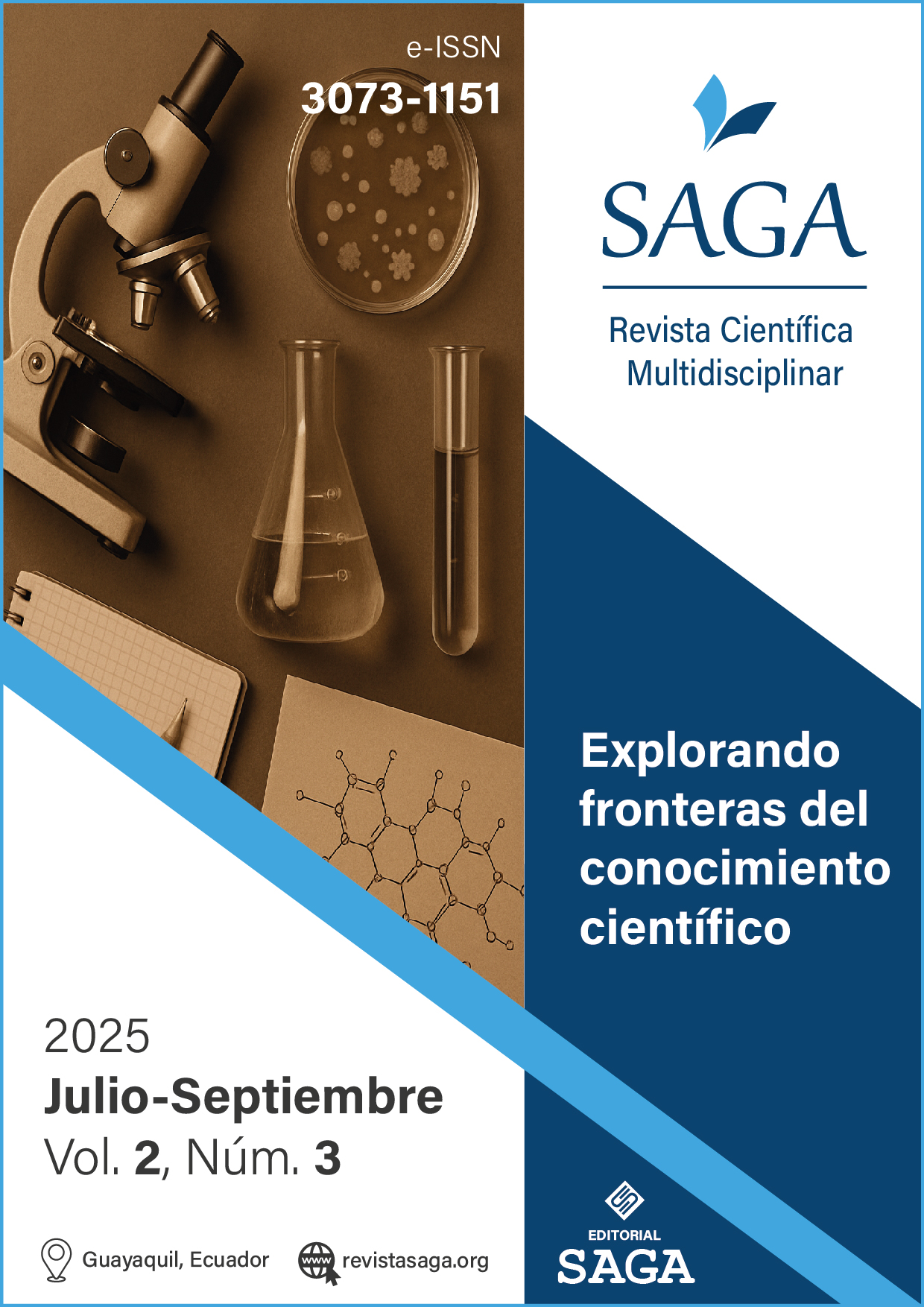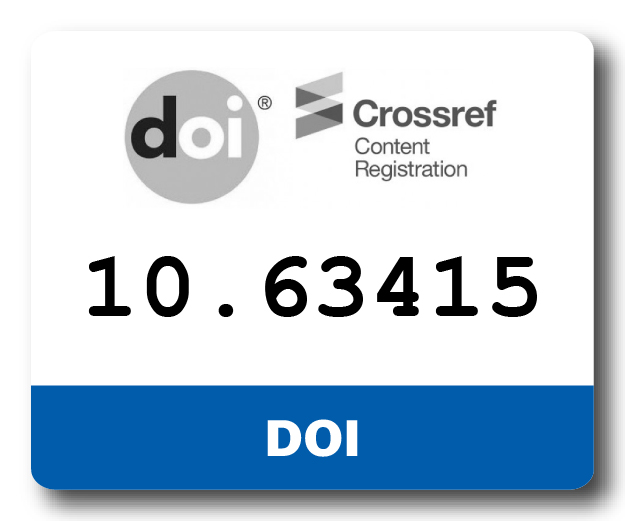Artificial Intelligence and Precision Medicine in the Early Detection of Ocular Diseases
DOI:
https://doi.org/10.63415/saga.v2i3.264Palabras clave:
artificial intelligence, precision medicine, diabetic retinopathy, glaucoma, age-related macular degeneration, early detectionResumen
Ocular diseases such as diabetic retinopathy (DR), glaucoma, and age-related macular degeneration (AMD) remain leading causes of preventable blindness worldwide. Early detection is critical, yet access to timely ophthalmologic evaluation is limited in many regions. This study evaluated the diagnostic accuracy and healthcare impact of artificial intelligence (AI) models, alone and combined with clinical and genomic data, across diverse Latin American populations. A total of 6,500 adults from Mexico, Colombia, and Ecuador underwent fundus photography, optical coherence tomography (OCT), and polygenic risk score (PRS) analysis, with data analyzed using convolutional neural networks and transformer architectures. The results showed that AI achieved strong diagnostic performance (AUC: DR 0.94, glaucoma 0.92, AMD 0.90), with improvements when clinical and genomic data were integrated (AUC up to 0.96 for DR and 0.95 for glaucoma). Subgroup analyses confirmed robustness across age and sex, although performance was lower in low socioeconomic groups. AI-assisted referral pathways reduced waiting times from 45 to 27 days, and performance was consistent across Mexico, Colombia, and Ecuador, with minor variations reflecting healthcare infrastructure. These findings demonstrate that AI combined with precision medicine can significantly improve early detection, enhance referral efficiency, and support equitable multinational deployment, reinforcing its potential as a transformative tool to reduce preventable blindness.
Descargas
Referencias
Alqahtani, A. S., et al. (2025). The efficacy of artificial intelligence in diabetic retinopathy screening: a systematic review and meta-analysis. Journal of Ophthalmology (Retina & Vitreous). https://doi.org/10.1186/s40942-025-00670-9
Kong, M., Suh, Y.-W., Lee, H.-J., Kim, S.-H., & Kim, J.-H. (2024). Artificial Intelligence Applications in Diabetic Retinopathy. Endocrinology and Metabolism, 39(3), 416-424. https://doi.org/10.3803/EnM.2023.1913
Singh, R. K., et al. (2024). Polygenic risk scores for glaucoma onset in the ocular hypertension treatment study. JAMA Ophthalmology, 142(5), 497-505. https://doi.org/10.1001/jamaophthalmol.2024.0151
Gao, X. R., et al. (2025). Multi-trait polygenic probability risk score enhances glaucoma prediction across ancestries. medRxiv. https://doi.org/10.1101/2025.03.27.25324762
Riotto, E., et al. (2024). Accuracy of autonomous artificial intelligence-based system (IDX-DR) for diabetic retinopathy detection. Journal of Clinical Medicine, 13(16), 4776. https://doi.org/10.3390/jcm13164776
Tahir, H. N., et al. (2025). Artificial intelligence versus manual screening for diabetic retinopathy: systematic review and meta-analysis. Frontiers in Medicine, 12, 1519768. https://doi.org/10.3389/fmed.2025.1519768
Hollitt, G. L., Allen, R., Kelley, S., Hodge, L., Seviiri, M., et al. (2024). Development and evaluation of patient-centred polygenic risk score for glaucoma. BMC Medical Genomics, 17, 79. https://doi.org/10.1186/s12920-024-02079-z
Vujosevic, S., et al. (2024). Novel artificial intelligence for diabetic retinopathy detection and management: Current opinion and future directions. Current Opinion in Ophthalmology, 35(6), 472-479. https://doi.org/10.1097/ICU.0000000000001084
Shahriari, M. H., et al. (2025). Applications of machine learning in glaucoma diagnosis: a systematic review. BMC Biomedical Engineering, 7, 95. https://doi.org/10.1186/s42490-025-00095-3
Jan, C. L., et al. (2025). Prospective pragmatic trial of automated retinal photography and AI-based screening system for glaucoma risk classification in general practice. NPJ Digital Medicine. https://doi.org/10.1038/s41746-025-01768-y
Xu, X., et al. (2024). The application of artificial intelligence in diabetic retinopathy: A comprehensive review of recent models, challenges, and opportunities. Frontiers in Cell and Developmental Biology, 12, 1473176. https://doi.org/10.3389/fcell.2024.1473176
Djulbegovic, M. B., et al. (2025). Artificial intelligence for optical coherence tomography in ophthalmology: review and challenges. Translational Vision Science & Technology, 14(3), 12. https://doi.org/10.1167/tvst.14.3.12
Crincoli, E., et al. (2024). Use of deep learning to predict short-term risk of exudation and treatment need in age-related macular degeneration. BMC Ophthalmology, 24, 381. https://doi.org/10.1186/s12886-024-03381-1
Lan, C.-H., Chiu, T.-H., Yen, W.-T., & Lu, D.-W. (2025). Artificial intelligence in glaucoma: advances in diagnosis, progression forecasting, and surgical outcome prediction. International Journal of Molecular Sciences, 26(10), 4473. https://doi.org/10.3390/ijms26104473
Hasan, M. M., et al. (2025). OCT-based diagnosis of glaucoma and staging with explainable AI. Scientific Reports, 15, 87219. https://doi.org/10.1038/s41598-025-87219-w
Beals, D., et al. (2024). Integrating AI-based retinal imaging in primary care: “Saving Sight” initiative. Digital Health Journal, 10, 2437294. https://doi.org/10.1080/28338073.2024.2437294
Maxwell, G., Allen, R., Kelley, S., Hodge, L., Hollitt, G. L., Seviiri, M., et al. (2024). Impact of polygenic risk score for glaucoma on psychosocial outcomes: INSiGHT study protocol. PLOS ONE, 19(12), e0312390. https://doi.org/10.1371/journal.pone.0312390
Frank-Publig, S., et al. (2025). Artificial intelligence in assessing progression of age-related macular degeneration. Eye, 39, 1467-1479. https://doi.org/10.1038/s41433-024-03460-z
Martucci, A., et al. (2025). Lights and Shadows on Artificial Intelligence in Glaucoma: Diagnostic and Management Perspectives. Journal of Clinical Medicine, 14(7), 2139. https://doi.org/10.3390/jcm14072139
Publicado
Número
Sección
Licencia
Derechos de autor 2025 Aryam Bernadette Wilson Ortiz, Ricardo Xavier Cárdenas Zambrano, Danilo Mesa Rincon, Giómar Adrián Crespo Rojas, Paola Alejandra Pérez Correa, Patricia Galilea Iduarte Marquez, Paula Andrea Agredo Santa, Laura Lorena Agredo Santa (Autor/a)

Esta obra está bajo una licencia internacional Creative Commons Atribución-NoComercial 4.0.



























